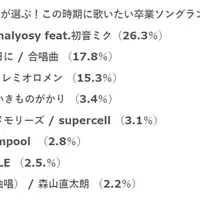そつぎょう ...(n 5) Graduation season
||graduation|
graduation|||
Schulabschluss ... (n 5) Abschluss der Saison
Sotsukyo ...(n 5) Graduation season
Remise des diplômes ... (n 5) Saison de remise des diplômes
Laurea ... (n 5) Stagione dei diplomi
Afstuderen ... (n 5) Afstudeerseizoen
Formatura ... (n 5) Época de formatura
Examen ... (n 5) Avslutningssäsong
Mezuniyet ... (n 5) Mezuniyet sezonu
相津乡 ...(n 5) 毕业季
相津鄉 ...(n 5) 畢業季
3月 は 、そつぎょう しき の きせつ です。
つき||||||
||畢業典禮||||
|||ceremony||season|
Der März ist die Schwelle für die Graduierung.
March is the month of graduation ceremonies.
Marzo è la soglia di laurea.
三月是一年中的月份。
三月是一年中的月份。
小学校 も 大学 も 日本 の 学校 は 3月 に そつぎょう しき を します。
しょうがっこう||だいがく||にっぽん||がっこう||つき|||||
Japanische Schulen, sowohl Grundschulen als auch Universitäten, halten im März ihre Abschlussfeiern ab.
Japanese schools, both elementary schools and universities, hold their graduation ceremony in March.
Le scuole giapponesi, sia elementari che universitarie, tengono la cerimonia di consegna dei diplomi a marzo.
日本的学校,包括小学和大学,都会在三月举行毕业典礼。
「そつぎょう しき で うた いたい きょく は 何 です か 」と いう アンケート が ありました。
|||||||なん|||||あんけーと||
|||歌曲||歌曲|||||||||
|||song||song|||||||survey||
Es gab einen Fragebogen mit der Frage: "Worüber möchten Sie bei der Abschlussfeier singen?"
There was a questionnaire asking, "What is the music you want to sing at your graduation?"
C'era un questionario che chiedeva "Cosa vuoi cantare durante la cerimonia di laurea?".
有一个问卷调查,问“你想在Sotsugyo Shiki唱什么音乐?”
学生 に 一ばん にんき が ある きょく は 、「桜 ノ 雨 」と いう きょく でした。
がくせい||ひとばん||||||さくら||あめ||||
||most|popular|||||cherry blossoms|of|||||
Die beliebteste Kategorie von Musikinstrumenten für Schüler war ein Musikinstrument namens "Cherry Blossom Rain".
The most popular day for students was a day called "Sakura no Ame" ("Cherry Blossom Rain").
Per quanto riguarda la prevalenza, quello chiamato la pioggia di fiori di ciliegio e stato il più diffuso.
在学生中最受欢迎的一天是被称为“Sakura no Ame”的一天。
この きょく は 、「ボーカロイド きょく 」と いう 、コンピューター で こえ を つくって いる うた です。
|||||||こんぴゅーたー|||||||
|||ボーカロイド|||||||||||
|||Vocaloid||||||voice||created|||
This song is a song called a "VOCALOID song" that uses a computer to create the voice.
Questa canzone, detta canzone Vocaloid, è una canzone generata al computer .
这首歌曲是一首使用计算机创作声音的名为“VOCALOID歌曲”的歌曲。
さくら が さく 3月 は 、友だち や 先生 と わかれる さびしい きせつ です。
|||つき||ともだち||せんせい|||||
|||||||||分別离开|||
||bloom|||friend||||to part|lonely||
Der März, wenn die Kirschblüten blühen, ist eine Zeit, in der Sie Ihre Freunde und Lehrer vermissen werden.
March, when the cherry blossoms are blooming, is a sad time to part with friends and teachers.
Marzo, quando fioriscono i ciliegi, è un periodo in cui si sente la mancanza di amici e insegnanti.
樱花盛开的三月,是与朋友和老师的别离之时。
でも 4月 から あたらしい せいかつ が すぐに はじまります。
|つき||||||
||||新生活|||
|||new||||will begin
Doch im April wird bald ein neues Leben beginnen.
But in April, a new life will soon begin.
Ma ad aprile inizierà presto una nuova vita.
然而,新的季节将于四月开始。

